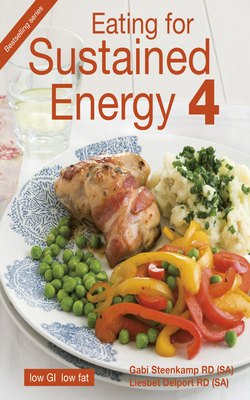Читать книгу Eating for Sustained Energy 4 - Gabi Steenkamp - Страница 4
На сайте Литреса книга снята с продажи.
Authors’ foreword
ОглавлениеWhen we originally compiled Eating for Sustained Energy 1, we had seven aims: we wanted each recipe to be tasty, and quick and easy to make, using ingredients that are affordable and readily available in any home, while also being lower in fat and having a lower glycemic index (GI) than traditional recipes. Our readers assure us regularly that we have achieved each one of these aims.
In fact, we had so many requests from satisfied readers for more recipes that we compiled Eating for Sustained Energy 2 and 3 and revamped Eating for Sustained Energy 1. The original was written 10 years ago, and so the nutrition information needed to be brought in line with the latest research. We hope that you are enjoying the new look and feel of the book. It still contains the original tried-and-tested recipes, but has new photographs to show you clearly, in a more up-to-date style, what you are going to prepare and what the end product should look like. In response to the many requests for more lower GI, lower fat recipes, we decided to put together this book, Eating for Sustained Energy 4. The recipes comply with all our original aims, but we have also tried to give most of the recipes more modern flair using unusual flavour fusions, while keeping them quick and easy to prepare, and not compromising on their nutritional content.
When we started writing Eating for Sustained Energy 1, we had no publisher and absolutely no idea that recipes of this kind would be so popular. What we did have was lots of enthusiasm and the knowledge that it is not that difficult to compile tasty, healthy recipes. In fact, we were both cooking and baking such dishes for our families every day! And we felt they should be shared with you, the public.
Now, after 10 years of steady and increasing sales of our recipe books, we know that these recipes work! Used regularly, they help to lower blood glucose levels of those with diabetes, and to reduce cholesterol levels, blood pressure, hyperinsulinemia and insulin resistance, as well as alleviate the symptoms of chronic candida, polycystic ovarian syndrome (PCOS) and inflammatory diseases such as arthritis. They also help children who suffer from attention deficit (hyperactivity) disorder (AD[H]D) to concentrate, overweight people to lose weight more easily, fatigued people to have more energy, and sportsmen and -women to perform better.
As before, we have included the GL value in the nutritional box of each recipe, together with the standard nutritional analysis. This is explained in easy-to-understand terms in the Introduction, which we have also condensed and updated for easier reading.
Our handy South African Glycemic Index and Load Guide has also proved to be of great help to many. It helps you to identify, quickly and easily, the GI and GL of most carbohydrate-containing foods eaten in South Africa, as it includes a cross-referenced alphabetical list of foods. Fat, fibre, protein, carbohydrate and kJ content per typical portion of food are also listed. Many people like to keep the guide with them when they shop, so that they can easily check the GI of any food. This book will be updated again in 2010 and also has a partner in the form of The South African Fat and Protein Guide, which contains valuable information about different types of fats and proteins in typical South African foods. Between these two guides you should be able to look up the nutritional information of any food you can think of.
Our book on weight management, Eat Smart and Stay Slim: The GI Diet, has also been updated to keep abreast of the dynamic science of nutrition. Apart from providing useful food information, this book should help users to get their mind right about getting thin and staying thin. The book also contains a few recipes, as well as a handy section on “meals for a week”, which allows users to combine any breakfast, lunch, dinner and two to three snacks per day, and so create a personalised meal plan or menu. Other invaluable information on how to get off the treadmill of compulsive eating, on label-reading skills, on fat-proofing meals and on motivation to start exercising is also included.
Eat Smart for Sport is another book in this series and shows the professional and amateur sportsperson, and concerned parents, exactly what and how much should be consumed before, during and after training and competition, as well as how to use the GI and GL to gain the competitive edge.
All our recipe books – Eating for Sustained Energy 1, 2, 3 and 4, Sustained Energy for Kids and Snacks and Treats for Sustained Energy – contain many more delicious recipes to help with weight management, blood glucose control, general healthy eating and improved sports performance.
May you enjoy this book as much as all the others!
Gabi and Liesbet
